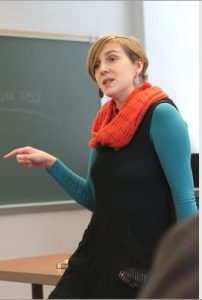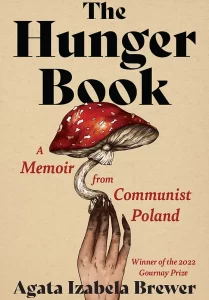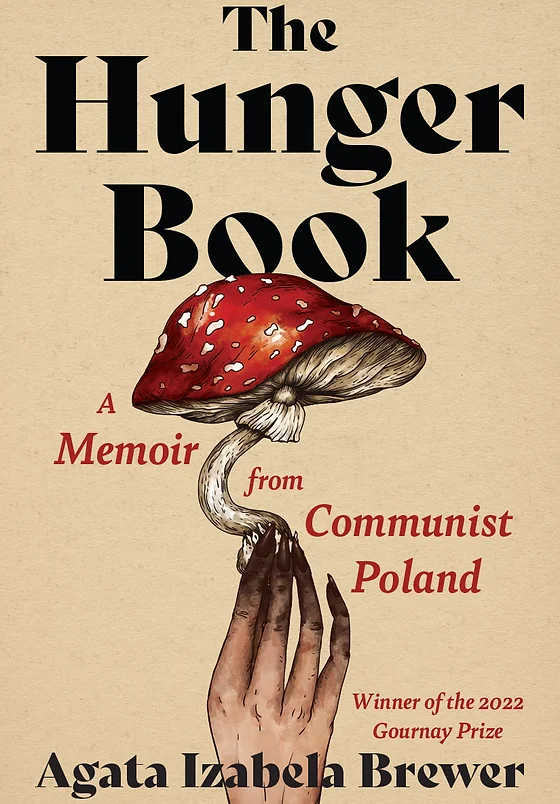DePauw kicked off its first Kelly Writer’s Series of the 2023-2024 academic year on Oct. 4, with author and Wabash English professor Agata Izabela Brewer. Brewer’s new memoir “The Hunger Book” was released to the public on Sept. 29, detailing her childhood growing up in communist Poland, while also meditating on her life now living in the U.S. In 2022, “The Hunger Book” won the Gournay Prize, which awards debut essay collections.

Professor of English Joe Heithaus introduced Brewer, describing her work as “based in memory, yet [moving] fluidly towards deep reading and thinking in the present.”
He continued, “[Brewer] tests her own memory to describe difficult relationships and circumstances, and she tests those memories against other knowledge, other stories. Her work tests us, as well. We have to contemplate hunger, and at the very same time, think on food.”
Brewer then took the stand, teasing the audience about the DePauw-Wabash rivalry, before reading several selected passages from “The Hunger Book.” Her first passage, a section of an essay titled “Mushrooms,” told the story of her parents’ tumultuous divorce and described her mother’s struggles with addiction. Brewer’s prose, rich with sensory details, pulled the audience into her memories of her mother’s alcoholism and suicide attempts.
“Mushrooms” represents Brewer’s writing style well, highlighting moments of pain and of hope in Brewer’s childhood. Reflecting on her memories (and the lack thereof, due to trauma-induced amnesia), Brewer asks important questions about intergenerational trauma, hunger, and a desire for love from a struggling mother. She contrasts these ideas with her own experiences as a parent in the United States, meditating on her own anxieties about passing trauma down to her children.
On her writing process, Brewer shared, “My goal for this book changed so often. Initially it was supposed to be an essay about my son’s rare condition . . . so his body was reacting to any protein I was feeding him. And so I wanted to explore what it means to be a mother who is supposed to be nurturing and helping him grow and thrive, to be unable to feed him.”
However, this singular essay soon grew beyond Brewer’s original plans. “That single essay morphed into a meditation on hunger in communist Poland. . . . And then I went to visit family in Poland, my great-uncles, and recorded some entries about their experiences during the war. So then it became something, larger than an essay, about epigenetic trauma –– trauma that goes from one generation to another. And then as I was writing about it, I thought that there was a greater hunger in my mind than hunger for food. It was a hunger for love from the person that was closest to me, that was supposed to be nurturing me.”
Brewer refers to this connection as a “thread of hunger,” which ties her memoir together. As she searched to understand her own relationship with food, foraging, and starvation, she also searched for the love that her mother was never able to provide. This revelation served as the inspiration behind “The Hunger Book.”

As the event came to an end, Professor Heithaus asked Brewer one final question. Reflecting on the loss of humanity that one feels when denied their basic rights to food, Heithaus asked, “Do you feel like telling these stories is a way to get [back] dignity?” He laughed, before continuing, “I’m trying to end this on a positive note!”
Brewer thanked him for the question, before responding, “[I have] a gnawing feeling of guilt that I’m even claiming a narrative of abuse, as well. . . . To put that down in writing and offer it to everybody. . . . Maybe that’s some kind of reclamation of dignity, in some way.”
Agata Izabela Brewer’s “The Hunger Book” was released on Sept. 29, and is available wherever books are sold. The next Kelly Writer Series event will be on Nov. 1 at 7:30 p.m. in the Peeler Auditorium, with poet James Fujinami Moore as the guest speaker.

